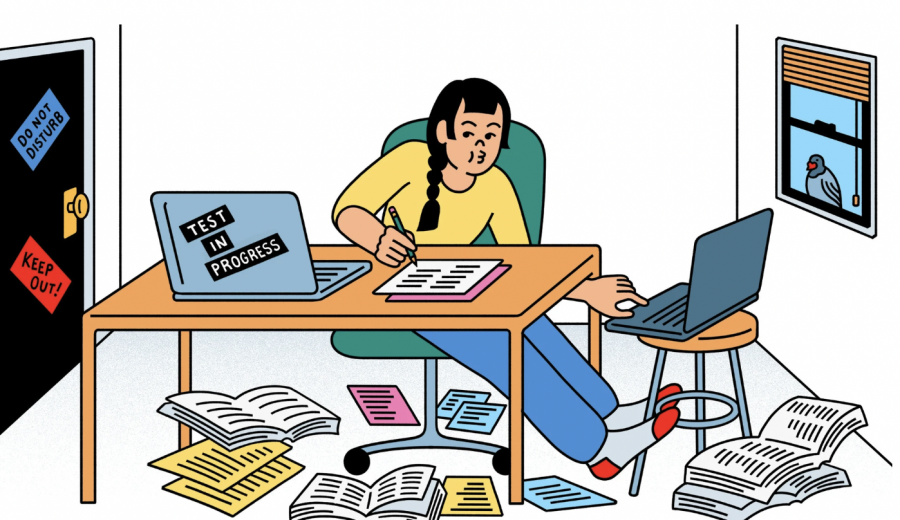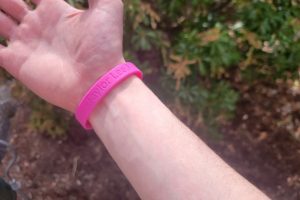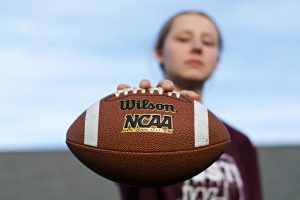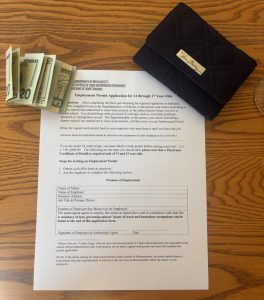Unique learning environment may undermine academic integrity
Student cheating online
May 14, 2021
Chegg, Coursehero, Slader, and Varsity Tutors. There’s something that all these websites have in common, and while I’d like to think that they’re used for the enrichment of student learning, that isn’t always the case. Over the pandemic school year, student dependency on online learning poses a hurdle for maximum academic retention and preparedness for the next school year, and can even bring academic integrity into question.
Without a doubt, COVID-19 has been a unique time period of our lives, and this distinct difference between normal school years and the ‘20-’21 school year has required certain changes to be made in numerous aspects of student life and academics.
For many classes this year, deadlines have been more spaced out and lenient, and teachers have taken incredible effort to make sure students are successful yet still cared for in terms of their mental health. In terms of instruction delivery and assignments, students and teachers alike must use the internet more often to complete their work for both ease and safety purposes amidst COVID-19. For most students, such considerations have allowed them to grow and learn in an extremely healthy manner.
However, with an increased online dependency this year, it seems as though this heightened dependence has almost transcended our needs of connecting all students to the classroom environment, into a platform that can facilitate students to resort to using the internet instead of thinking for themselves whilst completing school work tasks. Simply put, switching tabs on a laptop to look up the answers to a discussion question in English or scanning math problems into an online calculator is easier than challenging one’s own mind for answers.
The mentality of living in “unprecedented times,” a phrase often seen on social and news media, can sometimes be seen as a pillow to fall back on when justifying taking shortcuts to learning this year, ultimately leading to what seems like student desensitization to cheating or other forms of a lack of academic integrity.
Of course, there are many individuals whom COVID-19 has taken a serious toll on in terms of mental health and familial relationships, and there are legitimate reasons why some students in this situation need the extra help with balancing their workload. So, I feel as though students who may cheat more amidst COVID-19 just because it’s more facilitated in the “unprecedented” pandemic undermines the impact the pandemic had on people who legitimately suffered from the past year.
In addition, another layer to the issue is that students may be more inclined to seek academic shortcuts because they legitimately do not understand the material or nor have concepts ingrained into their minds as well as in a normal year, leading to the idea that cheating is the only way to get good grades especially because not physically being watched can spur cheating as well.
While teachers excel at making sure they keep classes engine while still maintaining high instruction delivery standards, especially during the hybrid model, it simply was not possible in many classes to teach as quickly or cover as much depth as normal years due to classes only meeting twice a week. As a result, a handful of students at the high school level seem to feel stuck with their inability for them to learn all the content well enough for an examination, despite pouring hours of time outside of school in order to prepare for these tests, which may spur more students to cheat. Although there are still plenty of ways for students to meet with teachers and clarify doubts, not having enough time this school year to actually learn content well enough in class may cause students to seek shortcuts and thus not learn the material to grow as a student for the next year.
Especially since students receive less assignments this year in many of their classes, there is an increased pressure on doing well on tests and assignments because they account for more of one’s grades, so using the internet at one’s fingertips seems to be an easier option as opposed to using one’s own knowledge, and I feel that some students think they do not have the choice to compromise their grades at the expense of gaining lasting knowledge by failing a test.
Without a doubt, the ubiquitous tenet among high schoolers today is that their future success and happiness depends on how well they do in high school and which college they attend, and the principal message teenagers hear is that going to a brand-name college is the ultimate goal. Since the only way to get there is through good grades and a well-built resume, which some students may want to acquire via extraneous methods. At the end of the day, cheating will never be the appropriate manner for a student to cope with his or her workload or societal/family expectations regarding their grades, no matter what the circumstances are.
Westford Academy is a school with exceptionally high standards and an even higher moral compass that steers a majority of students to choose knowledge over grades, yet this year that choice has started to get increasingly difficult to make for more students.
If next year is also a different learning year for students due to the pandemic, I hope that students are reminded more often of ways to reach out to their teachers so that remote or online students feel as though they are fully immersed in the class and that they can truly succeed without needing any shortcuts. Even if students receive more assignments that are of lower point values, yet total to the equivalent of a few larger examinations, then students would also feel less motivated to seek external methods for completing their tasks, and subsequently, they would have much higher retention of the information they are putting their mind to.








